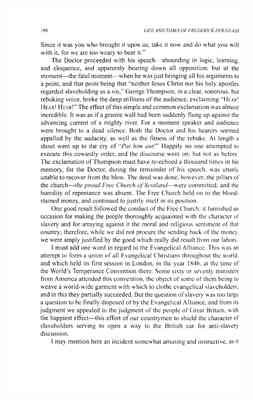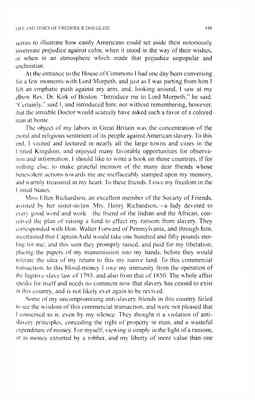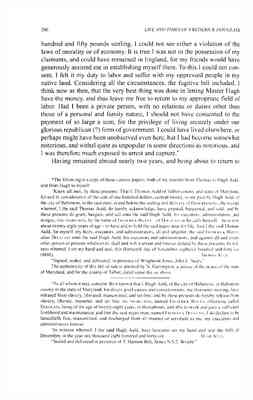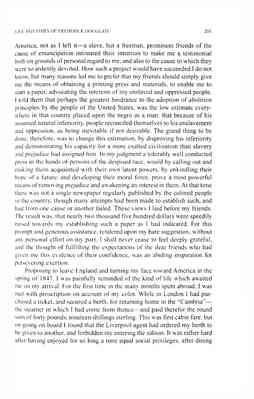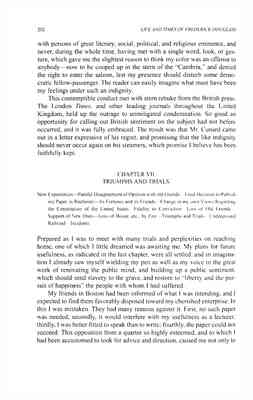Pages
46
198 LIFE AND TIMES OF FREDERICK DOUGLASS
Since it was you who brought it upon us, take it now and do what you will with it, for we are too weary to bear it."
The Doctor proceeded with his speech—abounding in logic, learning, and eloquence, and apparently bearing down all opposition; but at the moment—the fatal moment—when he was just bringing all his arguments to a point, and that point being that "neither Jesus Christ nor his holy apostles regarded slaveholding as a sin," George Thompson, in a clear, sonorous, but rebuking voice, broke the deep stillness of the audience, exclaiming "'HEAR! HEAR! HEAR!" The effect of this simple and common exclamation was almost incredible. It was as if a granite wall had been suddenly flung up against the advancing current of a mighty river. For a moment speaker and audience were brought to a dead silence. Both the Doctor and his hearers seemed appalled by the audacity, as well as the fitness of the rebuke. At length a shout went up to the cry of "Put him out!" Happily no one attempted to execute this cowardly order, and the discourse went on; but not as before. The exclamation of Thompson must have re-echoed a thousand times in his memory, for the Doctor, during the remainder of his speech. was utterly unable to recover from the blow. The deed was done, however; the pillars of the church—the proud Free Church of Scotland—were committed, and the humility of repentance was absent. The Free Church held on to the bloodstained money, and continued to justify itself in its position.
One good result followed the conduct of the Free Church: it furnished an occasion for making the people thoroughly acquainted with the character of slavery and for arraying against it the moral and religious sentiment of that country; therefore, while we did not procure the sending back of the money, we were amply justified by the good which really did result from our labors.
I must add one word in regard to the Evangelical Alliance. This was an attempt to form a union of all Evangelical Christians throughout the world. and which held its first session in London, in the year 1846, at the time of the World's Temperance Convention there. Some sixty or seventy ministers from America attended this convention, the object of some of them being to weave a world-wide garment with which to clothe evangelical slaveholders; and in this they partially succeeded. But the question of slavery was too large a question to be finally disposed of by the Evangelical Alliance, and from its judgment we appealed to the judgment of the people of Great Britain, with the happiest effect—this effort of our countrymen to shield the character of slaveholders serving to open a way to the British ear for anti-slavery discussion.
I may mention here an incident somewhat amusing and instructive, as it
47
LIFE AND TIMES OF FREDERICK DOUGLASS 199
serves to illustrate how easily Americans could set aside their notoriously inveterate prejudice against color, when it stood in the way of their wishes, or when in an atmosphere which made that prejudice unpopular and unchristian.
At the entrance to the House of Commons I had one day been conversing for a few moments with Lord Morpeth, and just as I was parting from him I felt an emphatic push against my arm, and, looking around, I saw at my elbow Rev. Dr. Kirk of Boston. "Introduce me to Lord Morpeth," he said. "Certainly," said I, and introduced him: not without remembering, however, that the amiable Doctor would scarcely have asked such a favor of a colored man at home.
The object of my labors in Great Britain was the concentration of the moral and religious sentiment of its people against American slavery. To this end. I visited and lectured in nearly all the large towns and cities in the United Kingdom, and enjoyed many favorable opportunities for observation and information. I should like to write a book on those countries, if for nothing else, to make grateful mention of the many dear friends whose benevolent actions towards me are ineffaceably stamped upon my memory, and warmly treasured in my heart. To these friends, I owe my freedom in the United States.
Miss Ellen Richardson, an excellent member of the Society of Friends, assisted by her sister-in-law Mrs. Henry Richardson,—a lady devoted to every good word and work the friend of the Indian and the African, conceived the plan of raising a fund to effect my ransom from slavery. They corresponded with Hon. Walter Forward of Pennsylvania, and through him, ascertained that Captain Auld would take one hundred and fifty pounds sterling for me; and this sum they promptly raised, and paid for my liberation; placing the papers of my manumission into my hands, before they would tolerate the idea of my return to this my native land. To this commercial transaction, to this blood-money I owe my immunity from the operation of the fugitive slave law of 1793, and also from that of 1850. The whole affair speaks for itself and needs no comment now that slavery has ceased to exist in this country, and is not likely ever again to be revived.
Some of my uncompromising anti-slavery friends in this country failed to see the wisdom of this commercial transaction, and were not pleased that I consented to it, even by my silence. They thought it a violation of antislavery principles, conceding the right of property in man, and a wasteful expenditure of money. For myself, viewing it simply in the light of a ransom, or as money extorted by a robber, and my liberty of more value than one
48
200 LIFE AND TIMES OF FREDERICK DOUGLASS
hundred and fifty pounds sterling, I could not see either a violation of the laws of morality or of economy. It is true I was not in the possession of my claimants, and could have remained in England, for my friends would have generously assisted me in establishing myself there. To this I could not consent. I felt it my duty to labor and suffer with my oppressed people in my native land. Considering all the circumstances, the fugitive bill included, I think now as then, that the very best thing was done in letting Master Hugh have the money, and thus leave me free to return to my appropriate field of labor. Had I been a private person, with no relations or duties other than those of a personal and family nature, I should not have consented to the payment of so large a sum, for the privilege of living securely under our glorious republican(?) form of government. I could have lived elsewhere, or perhaps might have been unobserved even here, but I had become somewhat notorious, and withal quite as unpopular in some directions as notorious, and I was therefore much exposed to arrest and capture.*
Having remained abroad nearly two years, and being about to return to
*The following is a copy of these curious papers, both of my transfer from Thomas Auld, and from Hugh to myself:
"Know all men, by these presents: that I, Thomas Auld of Talbot county and state of Maryland, for an in consideration of the sume of one hundred dollars, current money, to me paid by Hugh Auld, of the city of Baltimore, in the said state, at and before the sealing and delivery of these presents, the receipt whereof, I the said Thomas Auld, do hereby acknowledge, have granted, bargained, and sold, and by these presents do grant, bargain, and sell unto the said Hugh Auld, his executors, administrators, and assigns, ONE NEGRO MAN, by the name of FREDERICK BAILEY or DOUGLASS as he calls himself, he is now about twenty-eight years of age— to have and to hold the said negro man for life. And I the said Thomas Auld, for myself, my heirs, executors, and administrators, all and singular, the said FREDERICK BAILEY alias DOUGLASS unto the said Hugh Auld, his executors, and administrators, and against all and every other person or persons whatsoever, shall and will warrant and forever defend by these presents. In witness whereof, I set my hand and seal, this thirteenth day of November, eighteen hundred and forty-six (1846).
THOMAS AULD.
"Signed, sealed, and delivered, in the presence of Wrightson Jones, John L. Sears."
The authenticity of this bill of sale is attested by N. Harrington, a justice of the peace of the state of Maryland, and for the county of Talbot, dated same as above.
"To all whom it may concern: Be it known that I, Hugh Auld, of the city of Baltimore, in Baltimore county in the state of Maryland, for divers good causes and considerations, me thereunto moving, have released from slavery, liberated, manumitted, and set free, and by these presents do hereby release from slavery, liberate, manumit, and set free, MY NEGRO MAN, named FREDERICK BAILEY, otherwise called DOUGLASS, being of the age of twenty-eight years, or thereabouts, and able to work and gain a sufficient livelihood and maintenance; and him the said negro man, named FREDERICK DOUGLASS, I do declare to be henceforth free, manumitted, and discharged from all manner of servitude to me, my executors and administrators forever.
"In witness whereof, I the said Hugh Auld, have hereunto set my hand and seal the fifth of December, in the year one thousand eight hundred and forty-six.
HUGH AULD
"Sealed and delivered in presence of T. Hanson Belt, James N.S.T. Wright."
49
LIFE AND TIMES OF FREDERICK DOUGLASS 201
America, not as I left it — a slave, but a freeman, prominent friends of the cause of emancipation intimated their intention to make me a testimonial both on grounds of personal regard to me, and also to the cause to which they were so ardently devoted. How such a project would have succeeded I do not know, but many reasons led me to prefer that my friends should simply give me the means of obtaining a printing press and materials, to enable me to start a paper, advocating the interests of my enslaved and oppressed people. I told them that perhaps the greatest hindrance to the adoption of abolition principles by the people of the United States, was the low estimate everywhere in that country placed upon the negro as a man: that because of his assumed natural inferiority, people reconciled themselves to his enslavement and oppression, as being inevitable if not desirable. The grand thing to be done, therefore, was to change this estimation, by disproving his inferiority and demonstrating his capacity for a more exalted civilization than slavery and prejudice had assigned him. In my judgment a tolerably well conducted press in the hands of persons of the despised race, would by calling out and making them acquainted with their own latent powers, by enkindling their hope of a future, and developing their moral force, prove a most powerful means of removing prejudice and awakening an interest in them. At that time there was not a single newspaper regularly published by the colored people in the country, though many attempts had been made to establish such, and had from one cause or another failed. These views I laid before my friends. The result was, that nearly two thousand five hundred dollars were speedily raised towards my establishing such a paper as I had indicated. For this prompt and generous assistance, rendered upon my bare suggestion, without any personal effort on my part. I shall never cease to feel deeply grateful, and the thought of fulfilling the expectations of the dear friends who had given me this evidence of their confidence, was an abiding inspiration for persevering exertion.
Proposing to leave England and turning my face toward America in the spring of 1847, 1 was painfully reminded of the kind of life which awaited me on my arrival. For the first time in the many months spent abroad, I was met with proscription on account of my color. While in London I had purchased a ticket, and secured a berth, for returning home in the "Cambria" — the steamer in which I had come from thence — and paid therefor the round sum of forty pounds, nineteen shillings sterling. This was first cabin fare: but on going on board I found that the Liverpool agent had ordered my berth to be given to another, and forbidden my entering the saloon. It was rather hard after having enjoyed for so long a time equal social privileges, after dining
50
202 LIFE AND TIMES OF FREDERICK DOUGLASS
with persons of great literary, social, political, and religious eminence, and never, during the whole time, having met with a single word, look, or gesture, which gave me the slightest reason to think my color was an offense to anybody — now to be cooped up in the stem of the "Cambria," and denied the right to enter the saloon, lest my presence should disturb some democratic fellow-passenger. The reader can easily imagine what must have been my feelings under such an indignity.
This contemptible conduct met with stem rebuke from the British press. The London Times, and other leading journals throughout the United Kingdom, held up the outrage to unmitigated condemnation. So good an opportunity for calling out British sentiment on the subject had not before occurred, and it was fully embraced. The result was that Mr. Cunard came out in a letter expressive of his regret, and promising that the like indignity should never occur again on his steamers, which promise I believe has been faithfully kept.
CHAPTER VII.
TRIUMPHS AND TRIALS.
New Experiences-Painful Disagreement of Opinion with old Friends — Final Decision to Publish my Paper in Rochester — Its Fortunes and its Friends — Change in my own Views Regarding the Constitution of the United States — Fidelity to Conviction Loss of Old Friends Support of New Ones — Loss of House, etc., by Fire — Triumphs and Trials Underground Railroad — Incidents.
Prepared as I was to meet with many trials and perplexities on reaching home, one of which I little dreamed was awaiting me. My plans for future usefulness, as indicated in the last chapter, were all settled, and in imagination I already saw myself wielding my pen as well as my voice in the great work of renovating the public mind, and building up a public sentiment, which should send slavery to the grave, and restore to "liberty and the pursuit of happiness" the people with whom I had suffered.
My friends in Boston had been informed of what I was intending, and I expected to find them favorably disposed toward my cherished enterprise. In this I was mistaken. They had many reasons against it. First, no such paper was needed; secondly, it would interfere with my usefulness as a lecturer; thirdly, l was better fitted to speak than to write; fourthly, the paper could not succeed. This opposition from a quarter so highly esteemed, and to which I had been accustomed to look for advice and direction, caused me not only to
